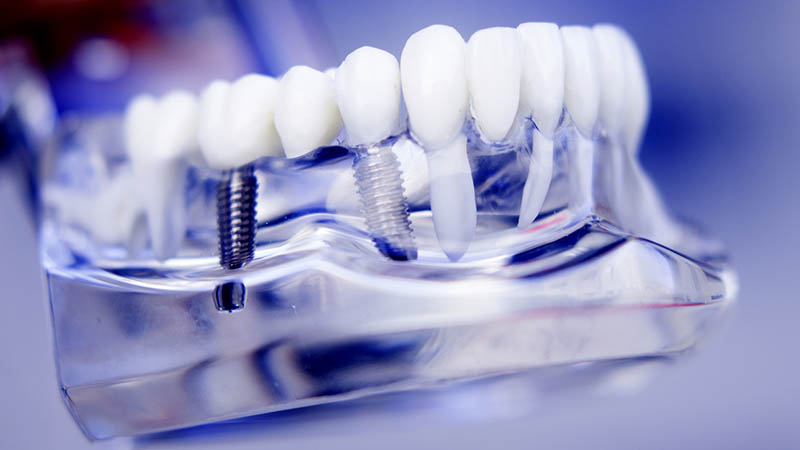Dental implants vs bridge is a question many patients are faced with when attempting to replace a lost tooth or multiple teeth. The traditional dental bridge was the main dental procedure used by dentists for a very long time to replace missing teeth. As dental implants have become popular due to long term success rates the traditional dental bridge has become in many people’s mind the lessor alternative. Dental implants vs bridge is an interesting scenario as they both achieve the same thing but in different ways. The dental implants vs bridge debate is one that many of us will face in our lives. Below are some facts about both to help with your decision.
Steps For A Dental Bridge
During the first visit to your dentist for the fabrication of a dental bridge, the teeth surrounding the missing tooth are prepared to accept a dental crown. The preparation involves removing the outer layer of teeth to allow for a dental crown to be placed over top them. Next, dental impressions of the teeth are taken, which give the dental lab technician a precise dental model from which the dental bridge, pontic (fake tooth between the dental crowns), and dental crowns will be fabricated. Your dentist will create a temporary dental bridge for you to wear to protect the exposed teeth and gums while the dental bridge is being made. This generally takes about 2 weeks.
At the second visit, your temporary bridge will be removed, the temporary cement will be cleaned off the teeth, and the new porcelain or metal bridge will be checked and adjusted, as necessary, to achieve an ideal fit. Depending on how extensive the dental bridge is multiple visits may be needed to check the fit of the metal framework and ensure the bite is correct. This is dependent on each individual’s case as metal can distort as well as teeth moving ever so slightly during time in between visits. If the fit is acceptable to the dentist, the dental bridge will then be cemented permanently in place. In the discussion of dental implants vs bridge, a traditional bridge is placed in only one way (cemented) while a dental implant can be placed in 2 different ways (screw retained or cemented).
-Initial Consultation. At this initial appointment, your dentist will complete a thorough dental examination, including all necessary x rays, and then take dental impressions of your teeth. After your dentist gathers all the necessary preliminary information, your dentist will talk with you about the recommended treatment plan. You may also discuss at this time whether or not there is a need for a bone graft. At this visit, you can ask about the dental implants vs bridge discussion. Your dentist will happily review the positives and negatives with you.
-Bone Grafting And Teeth Removal. If the tooth needs to be extracted, your dentist will evaluate the bone density and quality and decide if a bone graft is necessary. The bone graft will add 4-6 months generally to the time line. This extra time gives your bone time to heal properly and add the new bone structure.
-Dental Implant Placement. Once healing has taken place you will be ready for the dental implant placement. The procedure generally takes about 1-2 hours and completed under anesthesia. Once the dental implant is placed, you will need approximately 6 months for healing to take place and the dental implant to integrate into the bone (this process is called osseointegration).
-Healing Cap And Temporary Dental Crown. With the dental implant fully integrated in the bone, your dentist will attach what is called a healing collar to the top of the dental implant. This healing collar will allow the gum tissue to form around the implant in a natural looking way. The healing collar is simply a round piece of metal that keeps the gum tissue away from top of implant. The healing cap stays on for about 7-14 days. In some cases a temporary dental crown is fabricated as well at this visit.
-Abutment Placement. The healing cap will be removed and a dental implant abutment will be replace it. This abutment will be where the new dental crown will attach (either thru a screw or cement). Once the abutment is in place, your dentist will take a dental impression and send it off to the dental laboratory for fabrication of your new dental crown.
-Permanent Dental Crown Placement. The dental implant and dental crown should be a permanent fixture without the possibility of tooth decay forming over time like a traditional dental crown or dental bridge.
Dental Implants Vs Bridge Maintenance
This is where a dental implant will shine in the debate of dental implants vs bridge. A single dental implant will be cleaned just like your natural teeth. This means you can floss around the tooth just like a natural tooth. A dental bridge since it is one longer piece encompassing multiple teeth you will not be able to use regular floss. You will need to use what is called a floss threader. This will allow you to get under each part of the dental bridge and effectively clean around the areas of the dental bridge. This can be an issue for some patients with dexterity issues.
The dental implant will require more time (at least 6-7 months in best case) to allow for each step to be completed and healed properly. The dental implant tends to cost more overall especially if bone grafting is involved. In my opinion, dental implants vs bridge cost will be up to the patient. Time in some cases is just as important as the financial factor.
Dental Implants Vs Bridge Pros And Cons
 Dental Implant Positives
Dental Implant Positives
-Surrounding Teeth Unaffected. With a dental implant, there is no need to shave down possibly healthy tooth structure in adjacent teeth as there would be in a traditional dental bridge.
-Success Rate And Durability. Dental implants should with proper care last a lifetime and have a better than 98% success rate.
-Bone Loss Prevention. With a dental implant in place, your bone structure will remain as is and not resorb or break down. This is what happens when a tooth is missing in an area of the mouth
Dental Implant Negatives
-Surgery Required. A big negative in the dental implants vs bridge debate. This is especially true of those with dental phobia.
-Healing Time Needed. As mentioned above a minimum of 6-7 months are needed in the best case scenario to complete a dental implant procedure from start to finish.
-Financial Expense. There is generally a slightly higher fee for a single dental implant vs bridge and could go even higher if other procedures are needed like a bone graft.
Dental Bridge Positives
-Permanent. The dental bridge will be cemented in place and will never be removed to clean unless your dentist finds an issue.
-Simpler and Quicker Dental Procedure. Generally takes only 2 dental visits and can usually be completed in about 2 weeks time. This can be a huge positive for many in the dental implants vs bridge discussion.
Dental Bridge Negatives
-Dental Hygiene More Difficult. With a dental bridge, you must brush and floss under and around the false tooth. Using floss threader as mentioned above may be difficult for some. Dental hygiene maintenance is a must if there is any chance of long term success for a dental bridge.
-Lifespan Shorter. A dental bridge generally lasts about 7-10 years. Some dental bridges can last longer and some can fail sooner. This is due to the wear and tear on adjacent teeth (these teeth remain susceptible to periodontal disease and tooth decay. Either tooth decay or periodontal disease can weaken support for the dental bridge.
-Surrounding Teeth Affected. A dental bridge requires support from the surrounding teeth that are used to hold the artificial tooth in place. If these teeth are not strong enough to have dental crowns, a dental bridge might not even be possible.
Dental Implants Vs Bridge Conclusion
Choosing dental implants vs bridge can be a difficult decision. Your dentist will help guide you through the process and help you make an educated dental implants vs bridge decision that is best for your smile. It is important to maintain regular dental visits no matter which side you choose in the dental implants vs bridge decision.
© 2019, Marielaina Perrone DDS. All rights reserved. Exceptional Dentist Las Vegas






